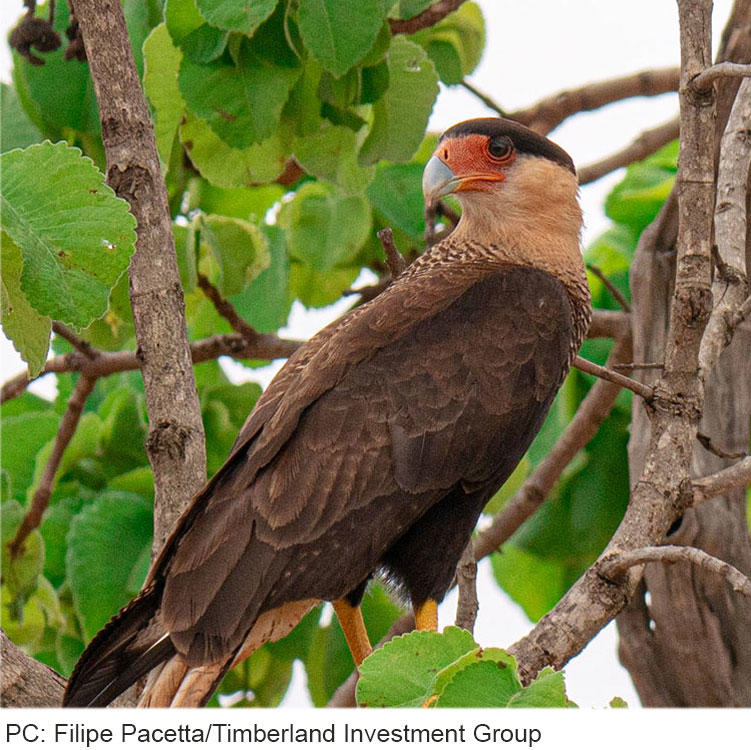Background
Climate change and biodiversity loss continue to negatively impact populations and ecosystems globally. Fortunately, natural climate solutions show great potential to mitigate climate change while also delivering social, environmental and economic benefits alongside financial returns.
Appreciation for the role of natural climate solutions is growing. Unlike other sources of emissions reductions and carbon removal, these solutions are both readily available and cost- effective. Growing consensus suggests that to meet the goals set out by the Paris Agreement and the Kunming-Montreal Global Biodiversity Framework, it is vital to take immediate action to invest in natural climate solutions.
Latin America is both vulnerable to climate change and ideally situated to adopt natural climate solutions at scale. It was in this context that BTG Pactual Timberland Investment Group (TIG) developed an impact-oriented reforestation investment strategy in Latin America in 2021.
Innovative partnership
A US subsidiary of BTG Pactual, TIG is one of the oldest and largest timberland investment management organizations in the world, overseeing assets and commitments of more than USD $5.6 billion across 3 million acres. TIG is also a founding member of the Forest Investor Club.
Conservation International (CI), a global environmental non-profit focused on science, policy and partnerships with businesses, governments and communities, is the impact advisor to the TIG reforestation strategy. CI appoints two of the three members of the strategy’s Impact Advisory Board, which is responsible for developing impact criteria and monitoring implementation. The aim of the collaboration between CI and TIG is to ensure that the design of the strategy maximizes environmental benefits and can support restoration and conservation at a landscape scale, improving connectivity among areas of natural habitat to support biodiversity recovery.
Solution
The TIG reforestation strategy seeks to acquire close to 300,000 hectares of degraded land in Brazil, Uruguay and Chile and protect and restore half of that area with native cover. In addition, the initiative aims to plant hundreds of millions of trees in commercial forests on the other half of the portfolio, which will be independently certified as sustainably managed by the Forest Stewardship Council. The strategy also aims to improve biodiversity and support community development by promoting inclusivity and equity and to contribute to the body of scientific knowledge about large-scale landscape restoration in the Cerrado region.
While Brazilian law requires that landowners in the region set aside 20% of their area for conservation, TIG’s strategy commits 50% of its portfolio to conservation and restoration. Over the life of the strategy, that could amount to nearly 100,000 hectares of additional landscape restoration over and above legal requirements – one of the largest known native forest reforestation programs. With the advice of Conservation International, the strategy aims to leverage private capital to achieve restoration at scale.
Under its reforestation strategy, TIG has already invested in close to 24,000 hectares of previously deforested land in Brazil that can now be conserved, restored and sustainably managed.
Throughout its 40 years of experience, TIG has returned USD $2.7 billion to investors in its timberland assets. With a long track record, an integrated environmental, social and governance (ESG) framework and well-established strategic collaborations with environmental NGOs, TIG has set itself apart in the industry. Adding to that, TIG applies 10 Stewardship Principles to each potential acquisition, ensuring an extra layer of confidence in its ability to uphold its ESG objectives:
- We seek to be good stewards, good neighbors, and industry leaders in managing our assets for risk-adjusted returns and positive community, nature, and climate impacts
- We seek to generate material benefits for communities, nature, and climate, consistently across our portfolio and to protect and enhance ecosystem function
- We strictly comply with all applicable environmental, social, health and safety, and other laws, regulations, and best practices, including anti-corruption and bribery regulations
- We seek to certify 100% of eligible assets to independent, third-party sustainable forest management standards
- We seek to support initiatives that strengthen our values
- We seek to report ESG performance with clarity and transparency
- We incorporate environmental, social, and climate risk and opportunity management into investment decisions
- We respect and uphold human rights across our footprint
- We seek to develop local supply chains and prioritize local hiring where possible, engaging local communities in our business and supporting rural economic development
- We support professional growth and development opportunities for all TIG staff and ensure awareness and understanding of our sustainability goals and principles by developing and providing relevant training programs
Expected impact
TIG aims to mobilize USD $1 billion over five years for the reforestation strategy, with an aim to deliver substantial climate, environmental and social benefits and attractive financial returns for its investors. The strategy aims to generate close to 35 million metric tons of carbon sequestration over 15 years, while re-connecting fragmented habitat through native landscape restoration.
Most recently, in 2023, the U.S. International Development Finance Corporation (DFC) announced its intention to assess potential financing of USD $50 million to support TIG’s five- year reforestation goal. U.S. President Biden made the announcement during the Major Economies Forum on Energy and Climate Change in April 2022 as part of a larger plan to mitigate climate change by scaling forest protection and restoration.
Sources
- Business Wire (2023). White House Announces DFC Working on $50 Million Debt Investment in TIG’s Latin American Reforestation Strategy. 20 April 2023.
- Conservation International (2021). Conservation International to Serve as Impact Adviser for TIG’s New $1 Billion Reforestation Strategy in Latin America. 27 October 2021.
- Environmental Finance (n.d.). Sustainable Investment Awards 2023: ESG investment initiative of the year, Latin America: The BTG Pactual Timberland Investment Group.
- ImpactAssets (n.d.). ImpactAssets 50 – An Annual Showcase of Impact Investment Fund Managers. BTG Pactual Timberland Investment Group.
- Timberland Investment Group (2023). White House announces DFC working on $50 million debt investment in TIG’s Latin American reforestation strategy. 20 April 2023.
- Timberland Investment Group (n.d.). Sustainability.

